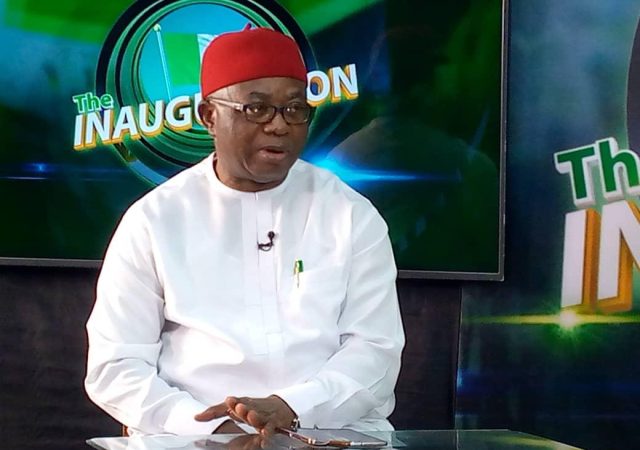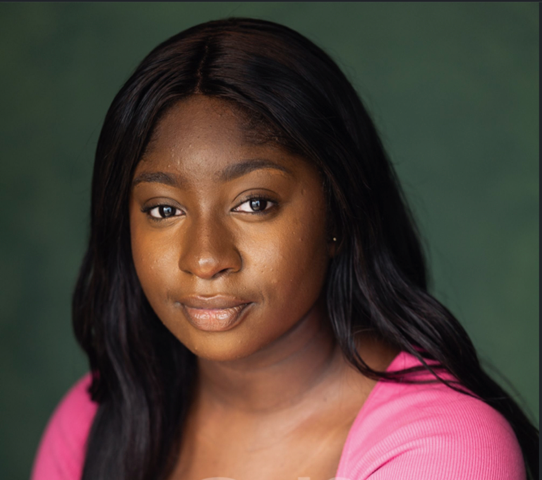
21-year-old Keitanloreoluwa Adediji, recently graduated from the University of Cambridge, where she studied Human, Social and Political Sciences (HSPS) at Magdalene College, specialising in International Relations. She was born and raised in London to Nigerian parents, so Keitanloreoluwa is a second-generation British-Nigerian.
Keitan as she’s fondly called was driven by a deep interest in politics and diplomacy, to study HSPS at Cambridge. HSPS helped her to better understand how power operates across borders, particularly within postcolonial contexts. During her time at Cambridge, she served on the African-Caribbean Society (ACS) committee as Publicity Officer, which helped her to celebrate cultural identity in a predominately white space. During her studies Keitan completed a field studies research project in Tunisia, funded by Magdalene College, which explored the informal economy and drew comparisons between the legacy of colonialism in North and West Africa.
According to her “living with dyslexia meant that academic life often required twice the effort. I’ve never considered myself a “naturally gifted” student, but with faith, determination, support. I’ve grown in ways I couldn’t have imagined.”
Keitan told Sunday Oyinloye, Publisher Green Savannah Diplomatic Cable that Cambridge taught her the power of perspective, and now, she wants to use that perspective to help shape a more connected, just world.
Excerpts:
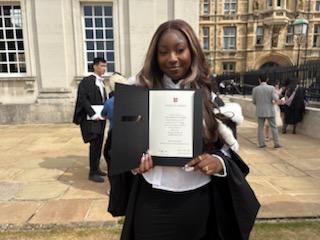
Growing up did you ever dream that you would attend one of the oldest and most prestigious universities in the world?
Not at all. I struggled a lot academically growing up, especially due to my dyslexia. I always intended to go to university, but I definitely wouldn’t have expected to attend a school like Cambridge, and I don’t think my family expected that of me either. My decision to apply was also a very last-minute step I took during my A-level studies. When a friend of mine, who also actually ended up studying HSPS, highlighted the subject to me, I went home and researched it. In the following weeks, I decided to apply. Although I hadn’t dreamed or thought of Cambridge growing up, because of the long nature of the application process, I became very invested once I had applied and visited the school. Now, looking back, attending Cambridge feels like a testament to what can be achieved through determination and support.
What informs your choice of Human, Social and Political Sciences ?
I studied Politics as a subject during my A-levels. I loved my politics teacher because he would often go into more depth than the textbook to teach us, and I always did very well in that class. I particularly loved our lessons about international politics and theories about the state and power. I had settled on applying to Politics and International Relations at the other schools I had applied to.
As I mentioned before, during a lesson, a friend of mine mentioned that she found a course called HSPS. It sounded like something I’d be interested in, so I went home and researched the course. The course also focuses on Sociology and Social Anthropology, as well as other subjects you can take in the first year. I really liked the idea of using other subjects to get a new and informed perspective on the field of politics.
Although I didn’t come to love the other subjects as much as politics, the interdisciplinary nature of the course broadened my perspective and helped me critically engage with the systems shaping political life. The fact that HSPS is only taught at Cambridge solidified my decision to apply to the university.
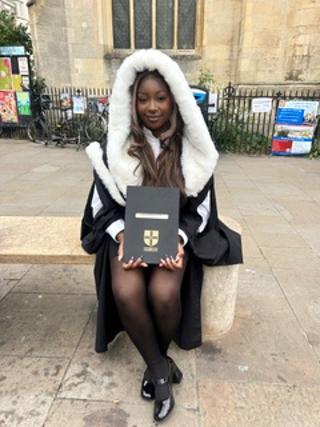
University of Cambridge is known for its academic rigour, how were you able to cope?
True to its reputation, Cambridge was definitely academically rigorous. I know that my ability to cope was down to God and His guidance during the course of my degree. I also had amazing professors. At Cambridge, we have a supervision system, which means that in addition to lectures, we get taught in small groups or in one-on-one sessions with leaders in the subjects. Having face-to-face discussions with the people who wrote the literature we were studying allowed me to stay motivated, and that motivation helped me push through even during the tougher times.
I think the key to succeeding in a tough environment like Cambridge is organisation and dedication to whatever schedule you lay out. I was able to invest my time in other things outside of my education because I stuck to my schedules.
During your studies, you completed a field studies research project in Tunisia, funded by Magdalene College, which explored the informal economy and drew comparisons between the legacy of colonialism in North and West Africa. Would you want to share your experience?
Cambridge provides a lot of opportunities to do research and funding to complete that research because it’s a research university. I originally applied for some of the funding the college had available and submitted a proposal for the work. Course material such as Dead Aid by Dambisa Moyo furthered my knowledge about the economic dependency that Africa still has on the West. However, when covering topics such as Frantz Fanon and researching how The Wretched of the Earth was written against the background of Algerians seeking independence from France, I quickly realised that although I had thought I was knowledgeable about colonial Africa, I was limited to Nigeria and other West African countries.
Upon this realisation, this became something I really wanted to change. Africa is often grouped together when considered on the international stage. I know specifically from my own cultural experience this is a very ignorant generalisation to make because each country in Africa has its own complex and unique identity. This can even be seen through the differences between Algeria and Tunisia. Not only did I lack knowledge about the colonial history of other parts of Africa, but I also had little to no knowledge about the continuous effects of colonisation on North Africa in the modern day.
My visit to Hammamet allowed me to experience the informal economy firsthand and revealed that the legacy of French colonisation is still deeply embedded in the town’s economic, social, and cultural fabric. While Tunisia has made significant strides since gaining independence, many of the inequalities and divisions created during the colonial period continue to shape contemporary Tunisian life.
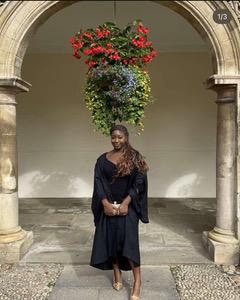
Why do you want to pursue a career in diplomacy and international organisations?
I want to pursue a career in diplomacy and international organisations because I’ve always been deeply aware of global inequalities, and I feel a strong drive to be part of efforts that bring about meaningful change. One of the highlights of my degree was studying International Security, which confirmed my desire to build a career in international relations. Through my studies in political philosophy, sociology, and international relations, I developed a critical understanding of how international institutions operate their strengths, limitations, and the real impact they can have. That academic foundation made me want to contribute in a practical, hands-on way.
From a young age, I was fortunate to travel frequently, which sparked my curiosity about the world and gave me an appreciation for different cultures and perspectives. I’m particularly interested in areas like conflict resolution and gender inequality, where diplomacy and international cooperation can make a tangible difference. I’ve always been strong in public speaking and negotiations, skills I believe are essential in this field. A career in diplomacy and international organisations represents the intersection of intellectual challenge and moral purpose. It’s where I feel I can contribute most meaningfully to building a more just and cooperative world.
What are your thoughts on the way young African girls are using the social media space?
I think the way young African girls are using social media is both inspiring and complex. On one hand, it’s incredibly empowering. Social media gives young girls a platform to express themselves, share their stories, challenge gender norms, and connect with opportunities they might not otherwise have access to whether in education, entrepreneurship, or activism. I use social media in similar ways myself, so I’ve seen firsthand how powerful it can be in building confidence, community, and awareness. At the same time, I’m cautious. I worry about the risks young girls face like online harassment, exploitation, and the pressure to conform to unrealistic beauty standards. That’s why I believe digital literacy is so important. Young people, especially girls, need the tools to use these platforms safely, critically, and effectively. If we can support that through education, mentorship, or policy we can help ensure social media remains a space of empowerment rather than harm.
What message do you have young girls who are aspiring to be great in life?
My message to young girls is this: you are more than capable of greatness, even when others underestimate you especially when they do. I’ve faced challenges myself, including living with dyslexia and being underestimated simply because I’m a woman. But those experiences taught me that your worth isn’t defined by how others see you—it’s defined by your faith, your purpose, and your determination. For me, my faith in God has been a constant source of strength, along with resilience knowing that setbacks don’t mean you’ve failed; they just mean you’re still growing. We rise faster and stronger when we uplift each other, share our stories, and build together as a collective. So to any young girl who dreams of doing something great with faith and hard work, no dream is too big for God.
What did your learn from your parents that contributed to who you are today?
I’ve learned so much from my parents—both through their words and through the example they set. My mum is one of the hardest working people I know. She taught me the value of giving your best in everything, always reminding me: ‘Anything worth doing is worth doing well.’ During exam seasons, she’d encourage me by saying, ‘It’s only for a short time—do your best and leave God the rest.’ That mindset really shaped how I handle challenges. It taught me discipline, delayed gratification, and faith in the process. My dad played a huge role in shaping how I see education. He’s incredibly accomplished. He has three degrees and he always instilled in me that education is not just a means to an end, but a privilege and an achievement in itself. Because of him, I see learning as something empowering and lifelong. Having this in the back of my mind is what really pushed me during some of the tougher times at Cambridge. Together, my parents’ values have made me resilient and grounded. I was raised to work hard, persevere, and never limit myself, qualities I carry with me in every space I enter today.
Tell me your big dream?
My big dream is to become a diplomat and, one day, serve as an ambassador. Being an ambassador is one of the highest and most influential roles within diplomacy. What inspires me most is the power diplomats have to change lives and promote peace. At the highest levels, the work done by diplomats can permanently alter the course of international relations, which is both a huge responsibility and a tremendous privilege. Without sounding audacious ambitious people like me want to make their presence felt in the world, and diplomats change lives and impact peace. I believe my skills in negotiation, public speaking, empathy, emotional intelligence, and communication will enable me to navigate complex situations and build meaningful relationships. Ultimately, I hope to leave a legacy of collaboration and understanding that benefits not just my country, but the global community.





